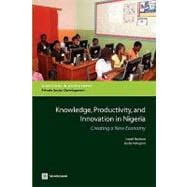
Note: Supplemental materials are not guaranteed with Rental or Used book purchases.
Purchase Benefits
What is included with this book?
| Foreword | p. xi |
| Acknowledgments | p. xiii |
| Abbreviations | p. xv |
| Overview | p. 1 |
| Knowledge for Development | p. 1 |
| Charting a Way Forward | p. 6 |
| Notes | p. 10 |
| Knowledge, Productivity, and Innovation | p. 11 |
| Why Is Knowledge So Important for a New Nigerian Economy? | p. 13 |
| What Is a Knowledge Economy? | p. 13 |
| What Does This Imply for Nigeria? | p. 16 |
| Assessing Nigeria's Opportunities and Challenges as a Knowledge-Oriented Economy | p. 18 |
| Advancing Nigeria's Education System | p. 27 |
| Developing Skilled Human Resources | p. 27 |
| Nigeria's Education System | p. 29 |
| Improving Access, Quality, and Funding | p. 36 |
| Summary: Improving the Nigerian Education System | p. 44 |
| Notes | p. 45 |
| Improving Nigeria's Business Environment | p. 47 |
| High Cost of Doing Business in Nigeria | p. 47 |
| Major Constraints to Business in Nigeria | p. 48 |
| Summary: Nigeria's Business Environment for the Knowledge Economy | p. 76 |
| Notes | p. 78 |
| Expanding Nigeria's Information Infrastructure | p. 79 |
| Information Infrastructure is Key to Productivity and Economic Growth | p. 79 |
| Benchmarking Nigeria's Information Infrastructure | p. 80 |
| Summary: Nigeria's ICT Infrastructure | p. 86 |
| Notes | p. 87 |
| Creating an Innovation Culture | p. 89 |
| What Is an Innovation System? | p. 89 |
| Benchmarking Nigeria's Innovation System | p. 90 |
| Summary: Creating an Innovation Culture | p. 99 |
| Notes | p. 100 |
| Case Studies | p. 101 |
| What Can Nigeria Learn from Other Countries? | p. 101 |
| India—Creating a Partnership for Knowledge | p. 103 |
| Where Does India Stand on the Knowledge Economy Today? | p. 104 |
| India's Knowledge Economy Strategy | p. 105 |
| Opportunities and Challenges Facing India's Knowledge Economy | p. 108 |
| What Can Nigeria Learn from India's Experience? | p. 113 |
| Notes | p. 114 |
| China Opening Up to Knowledge Economy Possibilities | p. 115 |
| Recent Issues and Continuing Challenges for China's Knowledge Economy | p. 120 |
| What Can Nigeria Learn from China's Efforts in Making a Transition to the Knowledge Economy? | p. 130 |
| The Republic of Korea: Coordination as Key to the Knowledge Economy | p. 133 |
| Economic, Social, and Industrial Coordination | p. 133 |
| Reforming Korea's Market Structure through Deregulation | p. 135 |
| Developing a Demand-Driven Education System | p. 136 |
| Developing Korea's Science and Technology Sector | p. 138 |
| Building Information Infrastructure | p. 140 |
| Continuing Challenges | p. 141 |
| What Can Nigeria Learn from Korea's Experience? | p. 142 |
| Singapore's Transition to the Knowledge Economy: From Efficiency to Innovation | p. 145 |
| Where Does Singapore Currently Stand in the Knowledge Economy? | p. 146 |
| Embarking on a New Innovation Strategy | p. 147 |
| Recent Issues and Challenges Facing Singapore's Knowledge Economy | p. 151 |
| What Can Nigeria Learn from Singapore's Innovation Strategy? | p. 157 |
| Annex: Innovation—The Key to Business Growth: The Irish Story | p. 158 |
| References | p. 163 |
| Index | p. 167 |
| Table of Contents provided by Ingram. All Rights Reserved. |
The New copy of this book will include any supplemental materials advertised. Please check the title of the book to determine if it should include any access cards, study guides, lab manuals, CDs, etc.
The Used, Rental and eBook copies of this book are not guaranteed to include any supplemental materials. Typically, only the book itself is included. This is true even if the title states it includes any access cards, study guides, lab manuals, CDs, etc.